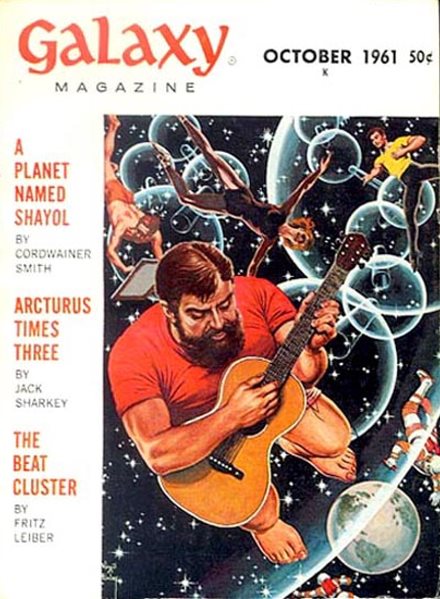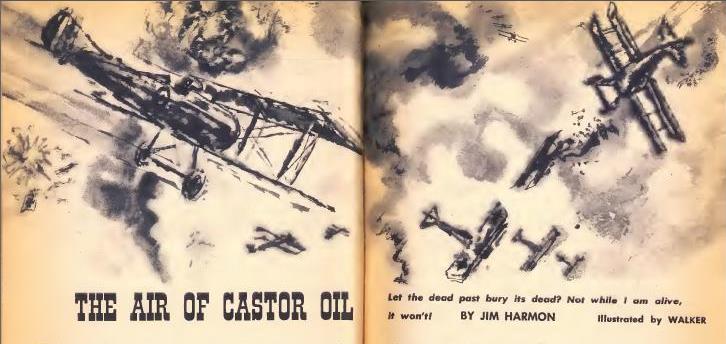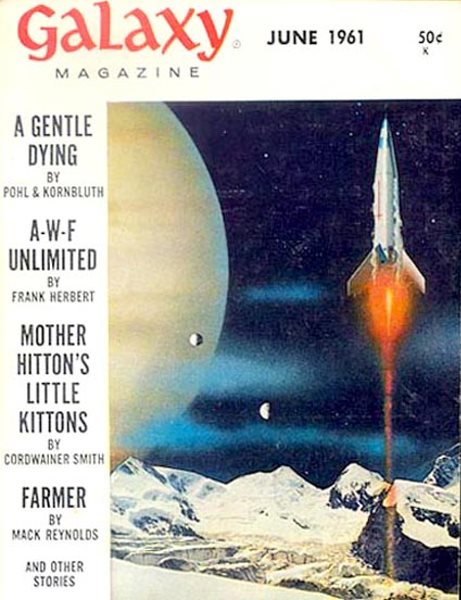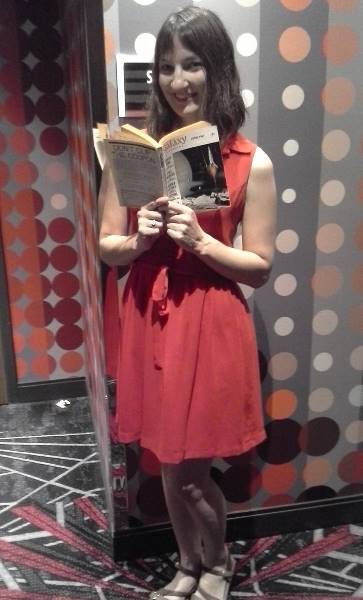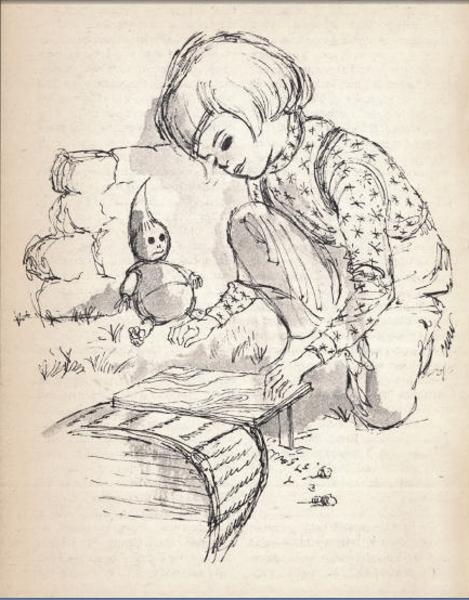
by Gideon Marcus
If there is any true measure of fame, it might well be the amount of fan mail you get. Many stars employ services to plow through their truckloads and give each missive personal response. Jack Benny came out on his TV stage last night holding a giant sack of fan mail – of course, it was really filled with trash and old cans…

Galactic Journey's popularity lies somewhere inbetween; we do get our fair share of postcards, but I haven't needed to hire help to read them…yet. Truth be told, it was for these correspondences that I started this column. I love meeting you folk – you start the most interesting conversations!
Science fiction magazines get letters, too. Many of these digests feature letter columns: Analog, IF, Amazing, and Fantastic. The two notable hold-outs are Fantasy and Science Fiction and Galaxy. I suspect the main reason for F&SF is lack of space, it being the shortest of the monthly mags.
Galaxy's reasoning is more complex. In fact, its editors (first H.L. Gold, now Fred Pohl) have polled readers to see if they wanted a lettercol. In the last 12 years' of the magazine's existence, the answer has always been no. Ironically, as much as I love talking to fellow fans, I think I'm in agreement (though I do like letters in comic books). More room for stories!
Speaking of which…have a look at the stories that came out in this month's quite good Galaxy, dated April 1962:

A Planet for Plundering, by Jack Williamson
Things start a bit slowly with our lead novella. Wain Scarlet is an anachronism – an atavistic maladjust in an interstellar society of humans. Where his countrymen are universally beautiful in form and thought, Scarlet is ugly and venal. Dispatched to the remote star system of Sol to determine whether or not to melt the Earth to use as a galactic stoplight, his sole concern is which of the parties involved can bribe him the most. Even the revelation that the third planet of the system may well be the ancestral home of humanity means little to him.
Jack Williamson has been around a long time, and his pulpish instincts often creep to the fore in this tale of first contact. Planet has moments of engagement, and the protagonist is delightfully anti-heroic, but the rough patches bog it down. Two stars.
Tail-Tied Kings, by Avram Davidson
Davidson, now editor for F&SF, continues his slide into mediocre self-indulgence. If you recall Miram Allen Deford's Oh Rats! from issue before last, you've got the plot of this one – superrats escape from captivity, poised to take over the world from their bipedal erstwhile masters. Not unreadable (like some of Davidson's other recent stuff), but why bother rehashing the same story? And so soon? Two stars.
Star-Crossed Lover, by William Stuart
Ah, but then we have William Stuart, who rarely disappoints and usually delights. This Galaxy veteran offers up a fun, tongue-in-cheek tale of romance between a loveable schlub and an eager-to-please, highly wanton ET. What could go wrong when you've got the literal woman of your dreams? You'll have to read and find out. Four stars.
For Your Information, by Willy Ley
Everyone's favorite German returns this bi-month with a piece on shaped charges. These are explosive shells whose effectiveness is multiplied by how the powder inside is molded. Pretty fascinating stuff, actually, but the letter Q&A portion afterward is lackluster. Three stars.
The Long, Silvery Day, by Magnus Ludens
You ever have one of those perfect days? When everything goes just perfectly? Ever wonder if someone was behind it? The impressively named Magnus Ludens is a brand new author, and he hits a triple his first time at bat. Four stars for this charming story.
Big Baby, by Jack Sharkey
If Stuart is a name that raises expectations, Sharkey's is one that lowers them. Big Baby is the next in his series starring Jerry Norciss, a telepathic member of the Contact service. His job is to jump into the minds of beasts on various planets to learn more about the local ecology. It's not a purely scientific mission – there's always a colony in trouble. The tidbits about the lonely, junkie-esque life of the esper are compelling, but Baby's menace isn't as interesting as the ones in his last story, there's far too much exposition, and the solution is clumsily rendered. Two stars.
Gourmet, by Allen Kim Lang
I've no particular reason to like Gourmet, about a spacer who can do wonders with algae rations – but I do. Perhaps it's because I fancy myself a gourmand, or because Lang is pretty good with the typewriter. Either way, it's a swell story. Four stars.
Founding Father, by J.F. Bone
Did the slaveowners think they were righteous? Do the Whites who lynch Blacks feel good about what they do? Founding Father puts us in the minds of a pair of reptilian aliens who investigate modern-day Earth. Their ship has insufficient fuel for the return trip, so they place mental taps into a married couple and compel them to collect some.
What ensues is a difficult read, particularly if mental coercion is your weak point. There is no happy ending, and the enslaved's resistance is slowly, methodically destroyed. Yet the slavemasters are not uncivilized. Their actions are justified, at least to themselves. And it's all rendered with a somewhat insouciant touch, appropriate given whose viewpoint we see through. Chilling.
This is an awfully hard piece to be objective about. It's a cruel story, all the more shocking for its lightness of tone. But I think it's deliberate. I've read enough of J.F. Bone to be assured that he knows what he's doing. If you finish Father without having addressed your feelings about slavery, racism, and the indignity of nonconsensual control, then you're either not getting the point, or you may have no soul. Tough stuff, but worthy. Four stars.
Moondog, by Arthur C. Clarke
About an astronaut and the dog who saves him, even over a distance spanning hundreds of thousands of miles, several years, and the veil of life. This is a rather pedestrian tale from perhaps the most preeminent of British sf authors, but to be fair, I'm more of a cat lover. Three stars.

So there you go – a jumbo-sized issue of Galaxy that finished on the good side of decent. Something to write home about? I leave that to you to decide…









